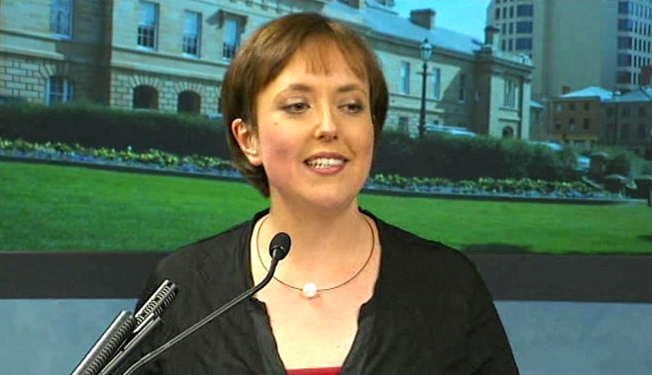With sustainability now a government buzzword, it’s time to get serious about the structural reforms needed to make it all happen. [28 June 2011 | Peter Boyer]
There was more than a little chutzpah in the Budget performance of Lara Giddings as she lined up cost-cutting targets in her plans to avoid the financial abyss ahead.
Closing schools, reducing police numbers and cutting hospital spending are guaranteed to press all the wrong buttons with electors, yet Giddings barely blinked as she prescribed her medicine.
With our children’s education, our communities’ security and our personal well-being to bear the brunt of spending cuts, the notion we once shared of an independent island, a state with the will and the infrastructure to take care of its own, suddenly looks very 20th-century.
All this tells us that the state’s books are in a worse state than anyone before Giddings has been prepared to admit. The 2008 world financial crisis ended the good times that opened the new millennium, but someone apparently forgot to tell Tasmania’s fiscal managers — none of whom, as far as I know, has acknowledged any responsibility for stuffing up.
It would be fair to assume that no part of government — not even Jim Bacon’s cultural and sporting icons — will be immune from the impact of the Giddings budget. So it comes as something of a surprise that some key measures addressing climate change seem to have survived relatively intact.
A handful of ministerial announcements in the wake of Giddings’s budget speech spelt out new or continuing programs to mitigate carbon emissions or help people adapt to more energy-constrained circumstances, among them:
• Tasmania’s antiquated, fragmented planning regimes have prevented energy conservation principles from being applied to new developments. A total of $6 million will be spent on providing clear and consistent laws with which every local council planning scheme will have to comply.
• To help Tasmanian businesses tackle rising power costs, free energy-efficiency workshops will be offered in 15 centres around the state to provide business owners and operators with cheap, practical ideas for reducing electricity usage.
• A $2 million two-year emergency relief scheme will include help for needy families to meet energy costs and acquire energy-efficient appliances, and $6 million will be spent over three years to inform households about saving energy, providing home energy audits and improving the energy efficiency of public housing.
• $1 million will support additional non-metropolitan bus services, following trials for new or expanded services for the Tamar, Derwent, Huon and Coal Valleys, Port Arthur, Swansea, St Helens, Cressy, Port Sorell and Ulverstone.
• Over the next five years, the state-owned power transmission company Transend will provide $100 million out of profits for new locomotives and rolling stock for Tasmania’s railway system.
• A further $1 million will be spent over three years, through the Renewable Energy Fund, to help the Bass Strait islands reduce their dependency on imported fuel by expanding their renewable energy generating capacity.
Sustainability seems to have become a government buzzword. Besides Giddings, Deputy Premier Bryan Green, Sustainable Transport Minister Nick McKim, Human Services Minister Cassy O’Connor and Economic Development Minister David O’Byrne put their names to these initiatives.
All this is good, but let’s not get ahead of ourselves. Even allowing that times are tough, the amount of hard cash being allocated to building a more sustainable future looks like peanuts against the hundreds of millions going into major roadworks.
It’s also small beer compared to the salaries and fees the government pays to those who service our public sector. Giddings knows that of all the factors she must consider in balancing the books, the cost of human labour is the toughest one to resolve. Hence her pre-emptive announcement that she would be capping salary increases and making it easier to lay off public servants.
Politicians and public servants’ salary regimes date from times of affluence that have long gone. As for the principle of job security, it’s never been applied equally. When redundancies are in the air, the expensive bureaucrats, given the job of deciding who goes, tend to stay put while lower-ranked, lower-paid, often more productive heads roll.
Tasmania can’t rely on the idea that our stable national economy will see us through. Europe looked rock-solid a few short years ago; now many people are being forced to take big pay cuts or lose their jobs. The mantra everywhere is to restructure, to build a system that won’t fall over tomorrow.
Giddings’s real challenge isn’t to get the state budget back into the black. It’s to face squarely our vulnerabilities, such as our exposure to rising power costs and imported transport fuel, and produce practical policies to get us through the transition to a more resilient economy.
Her struggle will be lost unless — unlike any of her predecessors — she can make some serious long-term savings in the cost of a top-heavy public service and reallocate a good proportion of this money to a much-expanded sustainability program that she now seems so keen to champion.
Oh — and restore some of the resources taken from our schools, hospitals and police.
• For more information on the government’s energy-efficiency workshops for business, tel. 1800440026 or email businesspoint@development.tas.gov.au.

